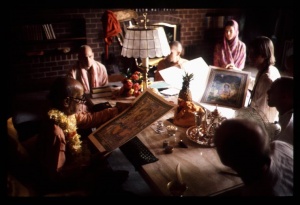CC Madhya 1.56 (1975)

A.C. Bhaktivedanta Swami Prabhupada
TEXT 56
- ei dhuyā-gāne nācena dvitīya prahara
- kṛṣṇa lañā vraje yāi--e-bhāva antara
SYNONYMS
ei dhuyā-gāne—in the repetition of this song; nācena—He dances; dvitīya prahara—the second period of the day; kṛṣṇa lañā—taking Kṛṣṇa; vraje yāi—let Me go back to Vṛndāvana; e-bhāva—this ecstasy; antara—within.
TRANSLATION
Lord Caitanya Mahāprabhu used to sing this song [seita parāṇa-nātha] especially during the latter part of the day, and He would think, "Let Me take Kṛṣṇa and go back to Vṛndāvana." This ecstasy was always filling His heart.
PURPORT
Being always absorbed in the ecstasy of Śrīmatī Rādhārāṇī, Śrī Caitanya Mahāprabhu felt the same separation from Kṛṣṇa that Śrīmatī Rādhārāṇī felt when Kṛṣṇa left Vṛndāvana and went to Mathurā. This ecstatic feeling is very helpful in attaining love of God in separation. Śrī Caitanya Mahāprabhu has taught everyone that one should not be overly anxious to see the Lord, but should rather feel separation from Him in ecstasy. It is actually better to feel separation from Him than to desire to see Him face to face. When the gopīs of Vṛndāvana, the residents of Gokula, met Kṛṣṇa at Kurukṣetra during the solar eclipse, they wanted to take Kṛṣṇa back to Vṛndāvana. Śrī Kṛṣṇa Caitanya Mahāprabhu also felt the same ecstasy as soon as He saw Jagannātha in the temple or on the Ratha-yātrā cart. The gopīs of Vṛndāvana did not like the opulence of Dvārakā. They wanted to take Kṛṣṇa to the village of Vṛndāvana and enjoy His company in the groves. This desire was also felt by Śrī Caitanya Mahāprabhu, and He danced in ecstasy before the Ratha-yātrā festival when Lord Jagannātha went to Guṇḍicā.